

How American 9/11 Journalists Talk about Objectivity in Crisis Coverage (Kirsten Mogensen) - Academia.edu. 222_wien. Journalistic Objectivity: Getting the Best Obtainable Version of the Truth Text of Speech at the Indymedia Conference – Nov. 13, 2010 Objectivity does not exist, in journalism or in any other sphere.
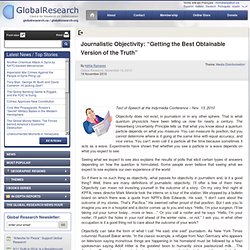
That is what quantum physicists have been telling us now for nearly a century. The Heisenberg Uncertainty Principle tells us that what you know about a quantum particle depends on what you measure. You can measure its position, but you cannot determine where is it going at the same time with equal accuracy, and vice versa. You can’t even call it a particle all the time because sometimes it acts as a wave.
Seeing what we expect to see also explains the results of polls that elicit certain types of answers depending on how the question is formulated. Lane_thesis. Media. Media / Political Bias There is no such thing as an objective point of view.
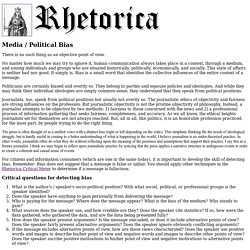
No matter how much we may try to ignore it, human communication always takes place in a context, through a medium, and among individuals and groups who are situated historically, politically, economically, and socially. This state of affairs is neither bad nor good. It simply is. Bias is a small word that identifies the collective influences of the entire context of a message. Politicians are certainly biased and overtly so. Journalists, too, speak from political positions but usually not overtly so. Majikthise : Journalism and objectivity. Paul McLeary posted an interesting article about journalism and objectivity at the Columbia Journalism Review.
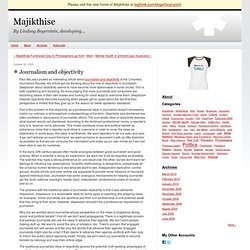
His article got me thinking about the role of objectivity in journalism. Skepticism about objectivity seems to have become more fashionable in some circles. This is both heartening and troubling. It's encouraging that more journalists and consumers are becoming aware of their own biases and looking for novel ways to overcome them. What’s the Point of Objectivity in Sports Journalism? An essay. Objectivity is the dominant ethos of modern journalism.
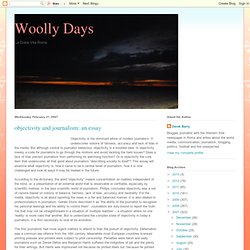
It underscores notions of fairness, accuracy and lack of bias in the media. But although central to journalist behaviour, objectivity is a troubled idea. Is objectivity merely a code for journalists to go through the motions and avoid tackling the hard issues? Does a lack of bias prevent journalism from performing its watchdog function? Or is objectivity the core item that underscores all that good about journalism “describing society to itself”?
According to the dictionary, the word “objectivity” means concentration on matters independent of the mind, or, a presentation of an external world that is observable or verifiable, especially by scientific method. Principles of Journalism. The first three years of the Project’s work involved listening and talking with journalists and others around the country about what defines the work.

What emerged out of those conversations are the following nine core principles of journalism: 1. Journalism’s first obligation is to the truth Democracy depends on citizens having reliable, accurate facts put in a meaningful context. Journalism does not pursue truth in an absolute or philosophical sense, but it can–and must–pursue it in a practical sense. Objectivity in Journalism. DAVID BROOKS There is some dispute about whether objectivity can really exist.

How do we know the truth? Well, I’m not a relativist on the subject. I think there is truth out there and that objectivity is like virtue; it's the thing you always fall short of, but the thing you always strive toward. And by the way, I think that opinion journalists have to be objective just as much as straight reporters. Opinion journalists, too, have to be able to see reality wholly and truly. Alex Jones: Objectivity in Journalism. Alex Jones: Objectivity in Journalism. Objectivity in Journalism. Omenugha-oji-news-commercialization. Objective journalism and mainstream media games. When I was sixteen years old, I had a memorable conversation with a friend about what we wanted to be when we got older.

I — in my typical state of indecision — rambled off a slew of completely unrelated job possibilities. I’m pretty sure one was an acrobat. My friend, on the other hand, had tunnel vision. She wanted to be a journalist. She had so much passion for the field, mostly because she saw it as a way to dig through the nonsense and deliver the facts. She never did follow that career path. The 2008 presidential election was quite eye-opening for me. Many in the mainstream media are waiting with bated breath to attack anyone on the right who has the audacity to boldly challenge Barack Obama’s failed “hope” and “change.”
When it comes to the GOP candidate who will challenge Obama in 2012, don’t expect many in the mainstream media to do their job the way they should. I want all 2012 candidates to be challenged. Rethinking Objective Journalism. July 8, 2003 | Like this article?
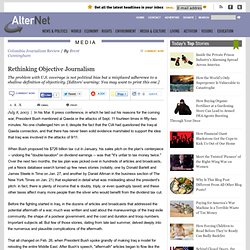
Join our email list: Stay up to date with the latest headlines via email. In his Mar. 6 press conference, in which he laid out his reasons for the coming war, President Bush mentioned al Qaeda or the attacks of Sept. 11 fourteen times in fifty-two minutes. No one challenged him on it, despite the fact that the CIA had questioned the Iraq-al Qaeda connection, and that there has never been solid evidence marshaled to support the idea that Iraq was involved in the attacks of 9/11. When Bush proposed his $726 billion tax cut in January, his sales pitch on the plan's centerpiece -- undoing the "double-taxation" on dividend earnings -- was that "It's unfair to tax money twice.
" Questioning Journalistic Objectivity. Journalism, as we've known it, has been mourned deeply over the last few years.
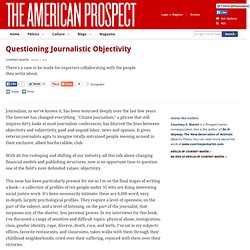
The Internet has changed everything. "Citizen journalism," a phrase that still inspires dirty looks at most journalism conferences, has blurred the lines between objectivity and subjectivity, paid and unpaid labor, news and opinion. It gives veteran journalists agita to imagine totally untrained people messing around in their exclusive, albeit hardscrabble, club. With all this reshaping and shifting of our industry, all this talk about changing financial models and publishing structures, now is an opportune time to question one of the field's most defended values: objectivity.
This issue has been particularly present for me as I'm on the final stages of writing a book -- a collection of profiles of ten people under 35 who are doing interesting social justice work. And I told them that I would show them drafts and give them a chance to give me feedback and correct inaccuracies before the pieces become public. The Myth of Objectivity in Journalism. By This page has been accessed since 29 May 1996.
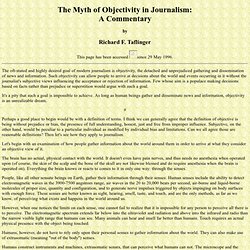
The oft-stated and highly desired goal of modern journalism is objectivity, the detached and unprejudiced gathering and dissemination of news and information. Such objectivity can allow people to arrive at decisions about the world and events occurring in it without the journalist's subjective views influencing the acceptance or rejection of information. Few whose aim is a populace making decisions based on facts rather than prejudice or superstition would argue with such a goal. Public Journalism and the Problem of Objectivity.